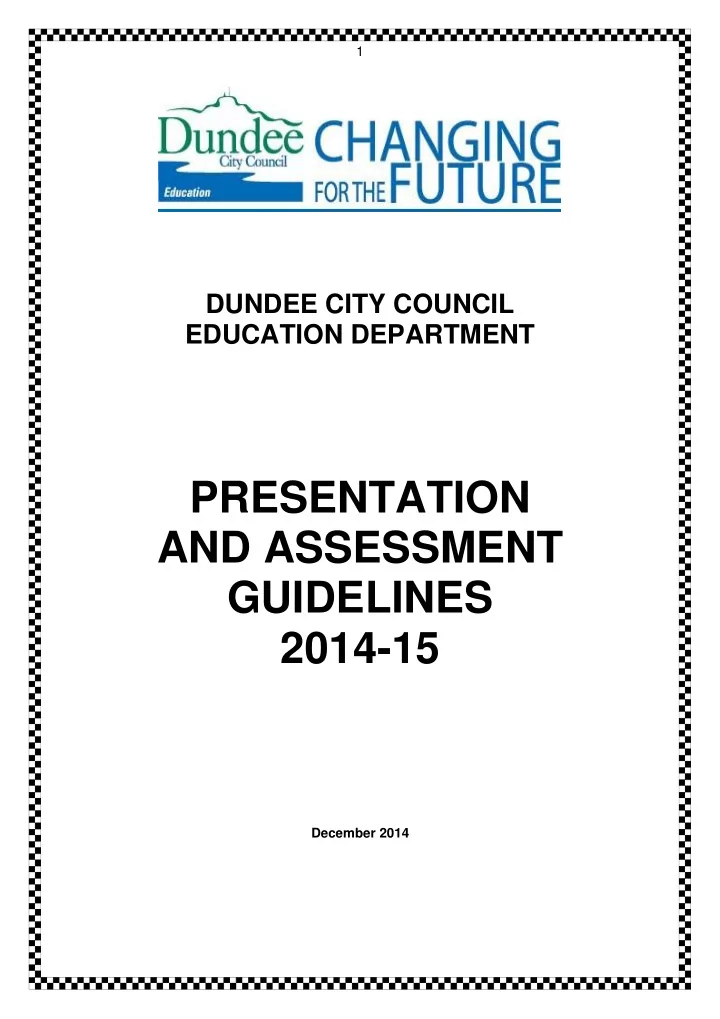

1 DUNDEE CITY COUNCIL EDUCATION DEPARTMENT PRESENTATION AND ASSESSMENT GUIDELINES 2014-15 December 2014
1 Contents 1 Introduction 2 Pupil and Parent/Carer Entitlement 3 Course Entry and Registration 4 Attainment and Achievement Budget 5 Assessment Arrangements 5.1 Internal Assessment 5.2 Internal Verification 5.3 Internal Verification Partnership Arrangements 5.4 External Verification 5.5 Assessment Instruments 5.6 Prior Verification 5.7 Assessment Conditions 5.8 Assessment Evidence 5.9 Reassessment 5.10 Movement between NQ levels 5.11 Assessment Arrangements for students with additional support needs 6 Prelim Examinations 7 External Assessment 8 Monitoring Pupil Progress, Recording & Reporting 9 SQA Results Services 10 Appendix 10.1 Useful documents/links SQA Charges – Joint Agreement 10.2
2 1 Introduction This document updates the Presentation & Assessment Guidelines (May 2013) and aims to assist schools/learning centres by providing guidance on issues pertaining to aspects of presentation and assessment within the examination framework of the new NQ provision. The document should also assist schools/learning centres and departments to update or revise whole school and departmental assessment policies and statements and bring them in line with revised SQA arrangements and conditions for the new NQ examination framework by stating the authority’s position in certain key areas. Assessment of the new National Qualifications is much more of a focus for individual schools than with the current qualifications. Given the importance of internal assessment at National 1 – 4 level, along with the greater contribution of coursework to the final grade at National 5 and beyond, it is essential that schools/learning centres and departments ensure that their procedures for assessment and moderation correspond fully to SQA requirements. The purpose of these guidelines is to outline the key areas identified by the SQA and to point towards certain issues that the authority view as crucial if these new assessment procedures are to be successful. The key SQA documentation that outlines their position as regards this is located at the following tabs within the SQA CfE Homepage at http://www.sqa.org.uk/sqa/58062.3806.html New Qualifications Outline http://www.sqa.org.uk/sqa/58085.3588.html Assessment and Exams http://www.sqa.org.uk/sqa/58863.3589.html Principles and Guidelines - http://www.sqa.org.uk/sqa/58431.3590.html This latter tab provides a link to key quality assurance and validation information. The following documents are also worthy of consideration New National Qualifications: management of assessment across the centre www.sqa.org.uk/sqa/files_ccc/Managing_Assessment_Across_the_Centre_Key_Que stions_FINAL.pdf Guide to Assessment http://www.sqa.org.uk/files_ccc/25GuideToAssessment.pdf Internal Verification: A Guide for Centres Offering SQA Qualifications - http://www.sqa.org.uk/sqa/files_ccc/InternalVerificationGuideforSQAcentres.pdf Prior Verification Guidance Document – http://www.sqa.org.uk/sqa/files_ccc/Prior%20Verification%20Centre%20Guidanc e%20FINAL.pdf Results Services http://www.sqa.org.uk/sqa/65427.html Introducing Results Services – new support from SQA http://www.sqa.org.uk/sqa/files_ccc/FA6669_SQA_Results_Services_A5_8pp_br ochure_web.pdf All centres and departments are expected to be familiar with the above documents along with these guidelines, and their implications for related school and department policies/operational procedures. Further information regarding such school/department policy and operational procedures is available from the school’s head teacher and/or SQA Coordinator.
3 2 Pupil and Parent Entitlement Dundee City Council Education Department requires that the following standards be guaranteed to pupils and parents from all schools/learning centres and departments: 2.1 Centres should ensure that students are allocated to a level of study appropriate to their abilities, needs and aspirations e.g. pupils engaging in a National 5 course of study should be secure within CfE level 4 experiences/outcomes or achieved a National 4 unit/course award. Progression routes from S4 for students of all abilities need to be considered and agreed between senior managers and subject departments. Established school practice in engaging with parents/carers and learners will continue to inform and support subject choices. 2.2 Pupils and parents/carers should be made aware at the beginning of a course of study of the parameters of movement between levels in all courses of study and that it may prove difficult to move to another level of study. In some instances, depending upon timetabling, staffing and hierarchy issues, a move to another level may not be possible. 2.3 Students should be advised at the beginning of each course of study of: An overview of the course/assessment requirements An indication of approaches to learning, teaching and assessment The stated outcomes and assessment standards for the unit as well as the overall course requirements. 2.4 Centres should ensure that where possible internal assessment is managed to avoid assessment hot spots. Pupils and parents/carers should be aware from an early stage where assessment points will occur. 1 The related SQA documents including: New National Qualifications: management of assessment across the centre, will be of support in this regard. 2.5 Schools should ensure that their reporting policy allows for informing parents/carers as well as students of any non-achieved units and subsequent reassessment opportunities/ timescales. 2.6 Schools should ensure that there is at least one point in the reporting cycle where parents/carers receive a comprehensive course report of their child’s progress within their course of study. 3 Course Entry and Registration 3.1 Centres should co-operate fully with the SQA on required student details for candidate and course registration. 3.2 Course entries should be made in accordance with SQA timelines. This is normally around 28th September. This will allow time for liaison between centres and the SQA regarding external moderation and verification procedures. 3.3 Course registrations should be made in accordance with SQA timelines. This is normally around 7 November. 1 www.sqa.org.uk/sqa/64556.4195.html - New National Qualifications: management of assessment across the centre, including – www.sqa.org.uk/sqa/files_ccc/Managing_Assessment_Across_the_Centre_Key_Questions_FINAL.pdf
4 3.4 Where possible, Centres should inform the SQA of any candidate level changes or withdrawals by 31 st March. Late entry charges will be applied to Centres, thereafter. All external assessment estimates – N5 and above - should be sent to SQA in line with published timelines. 3.5 Centres will be charged at the recently established SQA rates ( refer to SQA information on charges ). 3.6 Unit results should be submitted to SQA as soon as possible following completion date and within the timescales indicated by the SQA. 3.7 A list of key dates is available within - Delivering National Qualifications, Guide for SQA Co-ordinators (Key Dates)
Recommend
More recommend